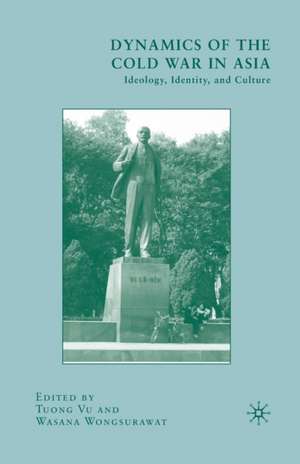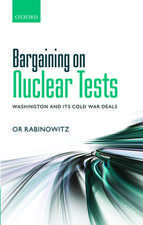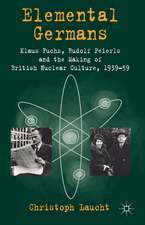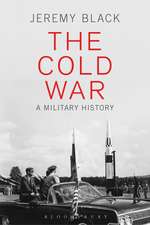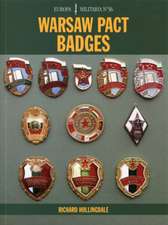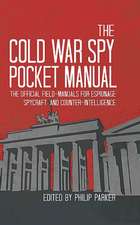Dynamics of the Cold War in Asia: Ideology, Identity, and Culture
Editat de T. Vu, W. Wongsurawaten Limba Engleză Paperback – 29 ian 2010
| Toate formatele și edițiile | Preț | Express |
|---|---|---|
| Paperback (1) | 382.95 lei 6-8 săpt. | |
| Palgrave Macmillan US – 29 ian 2010 | 382.95 lei 6-8 săpt. | |
| Hardback (1) | 386.81 lei 6-8 săpt. | |
| Palgrave Macmillan US – 29 ian 2010 | 386.81 lei 6-8 săpt. |
Preț: 382.95 lei
Nou
Puncte Express: 574
Preț estimativ în valută:
73.29€ • 76.23$ • 60.50£
73.29€ • 76.23$ • 60.50£
Carte tipărită la comandă
Livrare economică 15-29 aprilie
Preluare comenzi: 021 569.72.76
Specificații
ISBN-13: 9781349383719
ISBN-10: 1349383716
Pagini: 247
Ilustrații: XIII, 234 p. 4 illus.
Dimensiuni: 140 x 216 x 13 mm
Greutate: 0.3 kg
Ediția:1st ed. 2009
Editura: Palgrave Macmillan US
Colecția Palgrave Macmillan
Locul publicării:New York, United States
ISBN-10: 1349383716
Pagini: 247
Ilustrații: XIII, 234 p. 4 illus.
Dimensiuni: 140 x 216 x 13 mm
Greutate: 0.3 kg
Ediția:1st ed. 2009
Editura: Palgrave Macmillan US
Colecția Palgrave Macmillan
Locul publicării:New York, United States
Cuprins
Cold War Studies and the Cultural Cold War in Asia; T.Vu Early South Vietnamese Anticommunist Critique; T.Hoang 'To Be Patriotic Is to Build Socialism': Communist Ideology in Vietnam's Civil War; T.Vu Indonesian Architectural Culture during Guided Democracy (1960-1966): Sukarno and the Works of Friedrich Silaban; S.Sopandi Relocating Socialism: Asia, Socialism, and Communism in the PAP departure from the Socialist International in 1976; L.Yew Inventing a Proletarian Fiction for China: The Stalin Prize, Cultural Diplomacy, and the Creation of a Pan-Socialist Identity; N.Volland The Ideological Vanguard Contest: East Asian Communism during the 1960s and 1970s; B.Schaefer The Rhetoric as Politics: The Ramon Magsaysay Award and the Making of a Cold War Culture; R.Curaming Expulsion for a Mistranslated Poem: The Diplomatic Aspects of North Korean Cultural Policies; B.Szalontai From Yaowaraj to Plablachai: The Thai State and Ethnic Chinese during the Cold War Era; W.Wongsurawat
Recenzii
"Cold War history has been dominated for too long by those who thought they knew who were directing the Cold War around the world. Recent studies have begun to show how misleading that was. The authors in this volume have gone further to examine the active roles that Asian leaders played. They convincingly prove that the leaders were guided not only by national or developmental concerns but were also moved by cultural ideals that reflected both their own traditions and their response to universalist and internationalist aspirations. The important contributions made here challenge all historians to think afresh about the place of smaller powers in global affairs." - Wang Gungwu, University Professor, Faculty of Arts and Social Sciences, National University of Singapore
"This volume makes a major contribution to the field by re-centering the origins and development of the Cold War in Asia, and demonstrating how crucial Asia was to the conflict. It uses rich, empirical cases, many of them never before presented in English, to explore the way in which the Cold War reshaped East and Southeast Asia - and how those developments in turn shaped the global Cold War. This is essential reading for all serious scholars of the postwar era." - Rana Mitter, author of A Bitter Revolution: China's Struggle with the Modern World
"Tuong Vu and Wasana Wongsurawat's volume stands out in the existing historiography in international relations in that it patently shifts the emphasis from the American side of the Cold War to the Asian ones. . . [It] makes it clear that culture was as important a tool for Asian states as it was for the superpowers trying to influence them. . . This book and the debate it stirs will surely advance the study of the cultural dimensions of the Cold War in Asia." - H-Diplo, Christopher E. Goscha, Université du Québec à Montréal
"The essays. . . represent some of the most exciting work being done in international Cold War history." - H-Diplo, Jessica M. Chapman, Williams College
"This volume makes a major contribution to the field by re-centering the origins and development of the Cold War in Asia, and demonstrating how crucial Asia was to the conflict. It uses rich, empirical cases, many of them never before presented in English, to explore the way in which the Cold War reshaped East and Southeast Asia - and how those developments in turn shaped the global Cold War. This is essential reading for all serious scholars of the postwar era." - Rana Mitter, author of A Bitter Revolution: China's Struggle with the Modern World
"Tuong Vu and Wasana Wongsurawat's volume stands out in the existing historiography in international relations in that it patently shifts the emphasis from the American side of the Cold War to the Asian ones. . . [It] makes it clear that culture was as important a tool for Asian states as it was for the superpowers trying to influence them. . . This book and the debate it stirs will surely advance the study of the cultural dimensions of the Cold War in Asia." - H-Diplo, Christopher E. Goscha, Université du Québec à Montréal
"The essays. . . represent some of the most exciting work being done in international Cold War history." - H-Diplo, Jessica M. Chapman, Williams College
Notă biografică
TUONG VU is Assistant Professor in the Department of Political Science, University of Oregon, USA. WASANA WONGSURAWAT is Lecturer in modern Chinese history at the Department of History, Faculty of Arts, Chulalongkorn University, Thailand.
